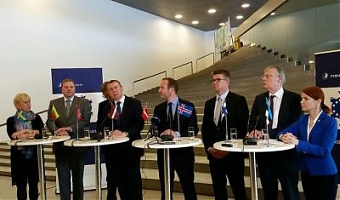Baltic States – CIS, EU – Baltic States, Forum, Latvia, Markets and Companies
International Internet Magazine. Baltic States news & analytics
Saturday, 07.02.2026, 08:35
Latvian MFA: the Eastern Partnership Summit will be a challenge for the EU
 Print version
Print version |
|---|
| Photo: flickr.com |
Edgars Rinkevics emphasised in his speech that it is essential to ensure representation at a high level, including the participation of foreign ministers, at the Eastern Partnership Summit in Riga. With the Riga Summit approaching, an increase of rhetoric from Russia against the Eastern Partnership can be observed, he said, and consequently the Easter Partnership Summit in Riga presents a historic challenge while – at the same time – posing a question of ‘to be or not to be’ for the Partnership itself in the future. The summit should give a clear and realistic answer, for instance, to Georgia and Ukraine in the area of mobility. The partner countries have high expectations for the Riga Summit, which is also understandable; and so reasonable compromises should be sought on the wording of the Riga Declaration,” the Latvian Foreign Minister said.
With reference to the developments in eastern Ukraine, Edgars Rinkevics drew attention to continued violations of the truce and the use of heavy weapons. The decisions by the European Council related to the sanctions regime with respect to the fulfilment of the Minsk agreements shows the EU’s ability in retaining a uniform, consistent and appropriate policy vis-a-vis Russia’s actions. Therefore, practical implementation of the Minsk agreement will continue to be decisive.
The Minister expressed the conviction that in the area of strategic communications and the media environment the EU should work in three directions: enhancement of strategic communication capabilities; media freedom and quality; and the promotion of media literacy, critical thinking. There are various parallel initiatives in the area of strategic communications – both within the EU and NATO framework; nevertheless, we must focus on joint action to achieve the desired result, Edgars Rinkevics emphasised.








 «The Baltic Course» Is Sold and Stays in Business!
«The Baltic Course» Is Sold and Stays in Business!

